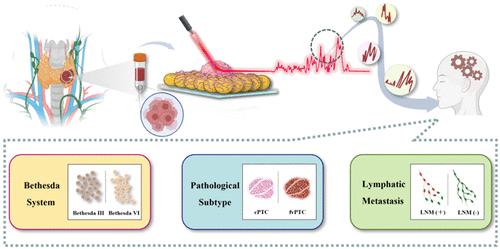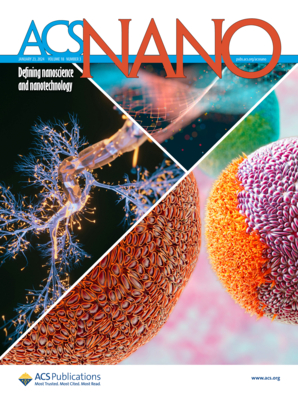基于深度学习辅助表面增强拉曼光谱的甲状腺乳头状癌亚型和淋巴结转移术前识别
IF 16
1区 材料科学
Q1 CHEMISTRY, MULTIDISCIPLINARY
引用次数: 0
摘要
准确的术前诊断甲状腺乳头状癌(PTC)的组织学亚型和淋巴结转移是制定个性化治疗策略的必要条件。然而,其术前诊断受到组织学亚型细胞学鉴定的有限可靠性和超声检查淋巴结的低准确性的挑战。本研究开发了一种深度学习辅助表面增强拉曼散射(SERS)芯片,用于术前诊断PTC组织学亚型和评估淋巴结转移,使用细针穿刺(FNA)样本。利用卷积神经网络算法对拉曼光谱指纹图谱进行分析,成功区分PTC亚型和淋巴结转移,准确率为95.83%。此外,深度学习辅助的SERS平台已成功用于识别中枢性颈淋巴结转移,准确率达到100%。这种方法突出了个性化医疗的潜力,促进了个性化治疗策略的发展,减少了过度治疗,降低了复发风险。本文章由计算机程序翻译,如有差异,请以英文原文为准。

Preoperative Identification of Papillary Thyroid Carcinoma Subtypes and Lymph Node Metastasis via Deep Learning-Assisted Surface-Enhanced Raman Spectroscopy
Accurate preoperative diagnosis of papillary thyroid carcinoma (PTC) histological subtypes and lymph node metastasis is essential for formulating personalized treatment strategies. However, their preoperative diagnosis is challenged by the limited reliability of cytological identification of histological subtypes and the low accuracy of lymph node detection using ultrasound imaging. Herein, a deep learning-assisted surface-enhanced Raman scattering (SERS) chip is developed for the preoperative diagnosis of PTC histological subtypes and evaluation of lymph node metastasis, using fine-needle aspiration (FNA) samples. The convolutional neural network algorithm is used to analyze Raman spectral fingerprints, successfully distinguishing PTC subtypes and lymph node metastasis with an accuracy of 95.83%. Moreover, the deep learning-assisted SERS platform has been successfully employed to identify central cervical lymph node metastasis with an accuracy of 100%. This approach highlights the potential of personalized medicine, facilitating the development of individualized treatment strategies, reducing overtreatment, and mitigating recurrence risk.
求助全文
通过发布文献求助,成功后即可免费获取论文全文。
去求助
来源期刊

ACS Nano
工程技术-材料科学:综合
CiteScore
26.00
自引率
4.10%
发文量
1627
审稿时长
1.7 months
期刊介绍:
ACS Nano, published monthly, serves as an international forum for comprehensive articles on nanoscience and nanotechnology research at the intersections of chemistry, biology, materials science, physics, and engineering. The journal fosters communication among scientists in these communities, facilitating collaboration, new research opportunities, and advancements through discoveries. ACS Nano covers synthesis, assembly, characterization, theory, and simulation of nanostructures, nanobiotechnology, nanofabrication, methods and tools for nanoscience and nanotechnology, and self- and directed-assembly. Alongside original research articles, it offers thorough reviews, perspectives on cutting-edge research, and discussions envisioning the future of nanoscience and nanotechnology.
 求助内容:
求助内容: 应助结果提醒方式:
应助结果提醒方式:


